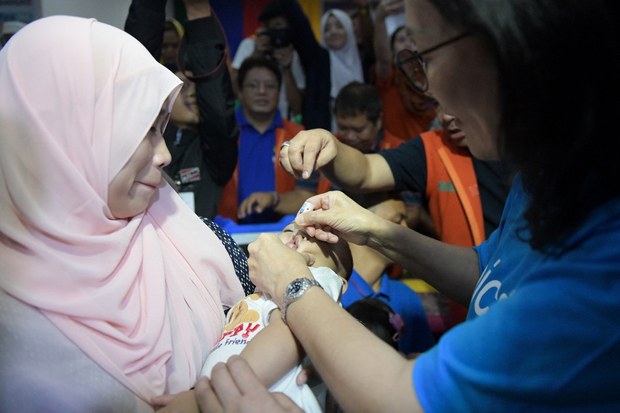Philippines Offers Polio Vaccinations as 3 More Children Show Symptoms
2019.10.14
Marawi and Manila, Philippines
 UNICEF representative Oyunsaikkhan Dendevnorow (right), administers polio vaccine to a child in the southern Philippine city of Marawi, Oct. 14, 2019.
UNICEF representative Oyunsaikkhan Dendevnorow (right), administers polio vaccine to a child in the southern Philippine city of Marawi, Oct. 14, 2019.
Three more children suffering from polio-like symptoms were admitted to a hospital in the southern Philippine city of Marawi, authorities said Monday, as health officials launched a vaccination program following re-emergence of the disease last month.
The government confirmed a second case of polio on Sept. 20, about 19 years after the nation was declared free of the disease that can cause nerve injury and paralysis.
“We urge all parents and caregivers, health workers, and local government units to protect their children and communities against the poliovirus by participating in the synchronized vaccination in high-risk areas in Mindanao,” and in the capital Manila, Health Secretary Francisco Duque told reporters.
Officials initially focused on the southern Philippines as the government aimed to boost immunization coverage by giving doses of oral polio vaccine to children younger than 5, Duque said.
Monday marked the start of mass vaccinations in the southern Philippines – in the cities of Marawi and Davao and in the provinces of Lanao del Sur and Davao del Sur. It is to be expanded to cover the entire southern Mindanao region by next month, with the project expected to be finished by January, officials said.
Polio, short for poliomyelitis, has no known cure and is transmitted through contaminated water or food. It may cause life-long paralysis and even death in rare cases.
The last case of wild poliovirus recorded in the Philippines was in 1993, according to the World Health Organization (WHO), which declared the Philippines polio-free in 2000.
The health department previously confirmed that a 3-year-old girl had been infected with the virus in Lanao del Sur. Sewage in Manila and waterways in the Davao region were confirmed to contain the virus.
In Marawi on Monday, Dr. Shalimar Sani Rakiin, chief of the Amai Pakpak Medical Center, said three children – all siblings and younger than 5 – were being monitored closely after showing polio symptoms.
“All exhibited a weakening of their leg muscles, which are symptoms of the polio virus,” Rakiin said as he updated Duque.
Most of Marawi remains in ruins after Islamic State-linked militants took over the city two years ago and engaged security forces in five months of firefights punctuated by aerial bombings that killed more than 1,200 people, most of them militants.
Duque asked local health officials to send stool samples to the health department’s Research Institute for Tropical Medicine in Manila before authorities can issue a confirmation.
“The confirmatory test results are important because not all symptoms of weakening leg muscles are polio,” Duque said.
Symptoms include fever, fatigue, headache, vomiting, stiff neck and sudden onset of floppy arms or legs. A severe case among children younger than 5 can lead to permanent paralysis or even death, according to WHO.
Vaccination
More than 18 million people worldwide are able to walk today and 1.5 million childhood deaths have been averted because of the oral polio vaccine (OPV), which was introduced in 1988, the WHO said in a statement.
OPV contains a weakened form of the virus and activates an immune response in the body. When a child is immunized, the weakened virus replicates in the intestine for a limited period, developing immunity by building up antibodies, WHO said.
Health officials were aiming to vaccinate 95 percent of children younger than 5 in Lanao del Sur province, Duque said, adding that about 198,000 doses of the vaccine have been delivered. Children can be vulnerable as a 2007 DOH study revealed only 10 of 100 houses have toilets, Duque said.
Meanwhile, the vaccination rate at 60 percent is quite low, he said.
Abdulhamid Amerbitor, a provincial board member, said one of the reasons for the lack of acceptance among parents here was fear, with many residents mistakenly thinking the vaccines did not pass halal standards.
“We have to go house-to-house to dispel these beliefs. It is very tiring,” Amerbitor told reporters.
But news reports that a 3-year-old girl from Marogong town in Lanao del Sur scared many parents, Amerbitor said.
“Maybe they will allow their children to be vaccinated this time because it is not easy to have a sick child in the family,” he said.







